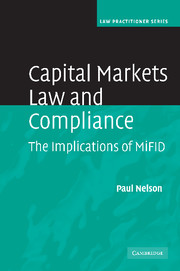Book contents
- Frontmatter
- Contents
- Preface
- List of acronyms
- Part I Evolution of capital markets regulation, FSA and the European single market
- 1 Introduction
- 2 FSMA and the single market
- Part II Licensing and rule application
- Part III The firm's infrastructure
- Part IV Conduct of business
- Part V Application of rules to particular businesses
- Bibliography
- Index
2 - FSMA and the single market
Published online by Cambridge University Press: 03 December 2009
- Frontmatter
- Contents
- Preface
- List of acronyms
- Part I Evolution of capital markets regulation, FSA and the European single market
- 1 Introduction
- 2 FSMA and the single market
- Part II Licensing and rule application
- Part III The firm's infrastructure
- Part IV Conduct of business
- Part V Application of rules to particular businesses
- Bibliography
- Index
Summary
Evolution
When analysed historically, any area of UK financial services regulation resolves itself into seven phases of development, each of which needs to be understood for a complete understanding of contemporary regulation and, in this Chapter, is illustrated by reference to the capital markets:
I. A series of ad hoc and, at first sight, random and unconnected rules formulated as a response to individual and particular social and economic problems. In the regulation of the capital markets this phase lasted up to the 1930s. See 2.2.
II. ‘Institutional regulation’ of a particular type of firm, conducting a particular type of business, in the form of required registration of that firm with a government body, supported by limited conduct and/or prudential rules of the type found in Phase I. Complete institutional regulation subjects the firm to regulation of all its activities, whether or not within the description that requires registration in the first place, although in this Phase, which lasted up to the 1980s in the Capital Markets, the imposed regulation was piecemeal and, once registered, the firm was regulated in only limited aspects of its activities. See 2.3.
III. ‘Functional regulation’ of a particular type of activity, irrespective of the nature of the firm carrying it on, through licensing by a Government Department and/or self-regulatory body (itself under statutory supervision), supported by rules governing the activities as a whole of the firm. This Phase, represented by the 1986 FSAct, lasted for 15 years up to the early 2000s. See 2.4.
[…]
- Type
- Chapter
- Information
- Capital Markets Law and ComplianceThe Implications of MiFID, pp. 8 - 60Publisher: Cambridge University PressPrint publication year: 2008

